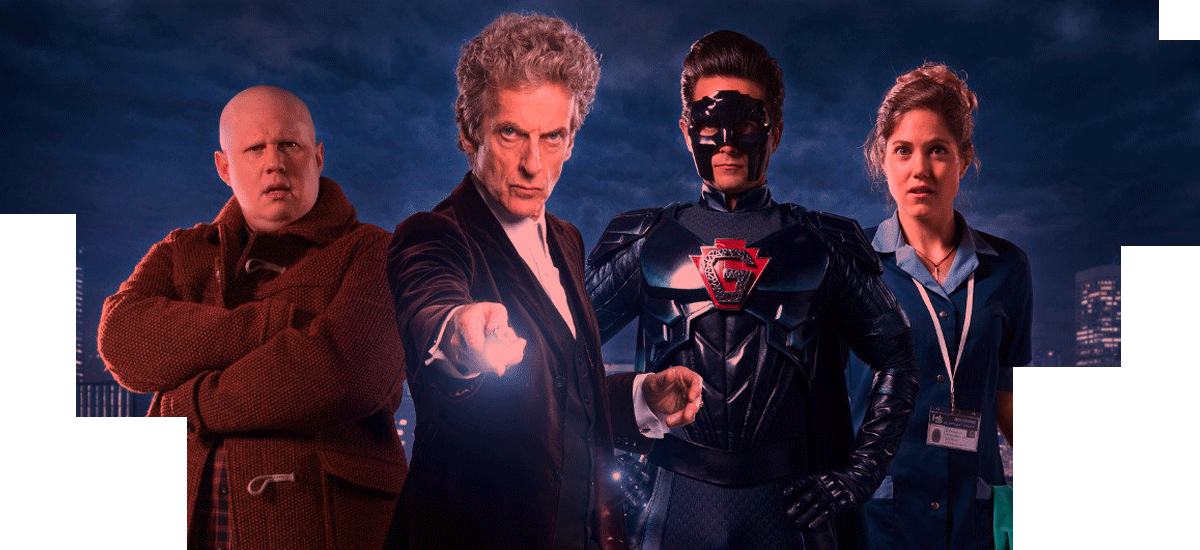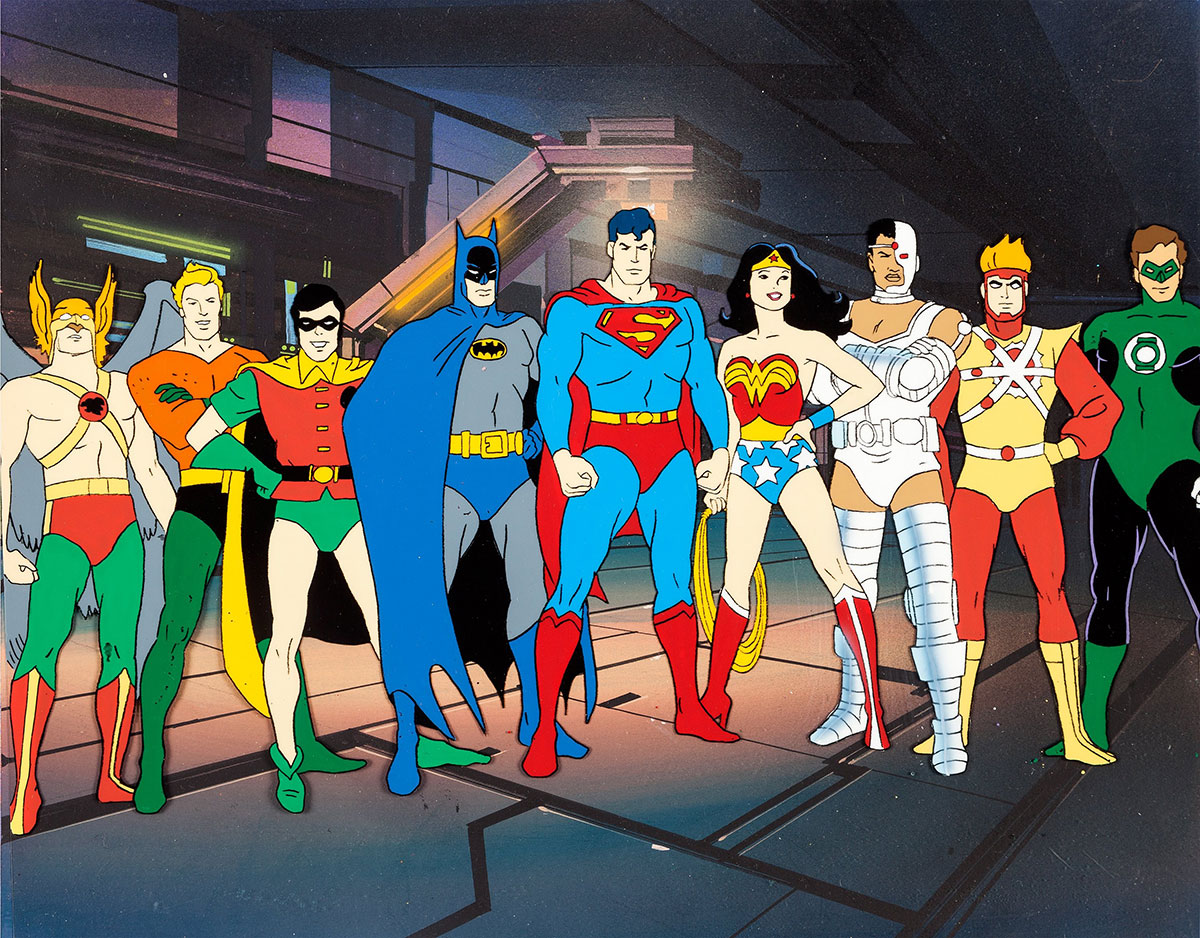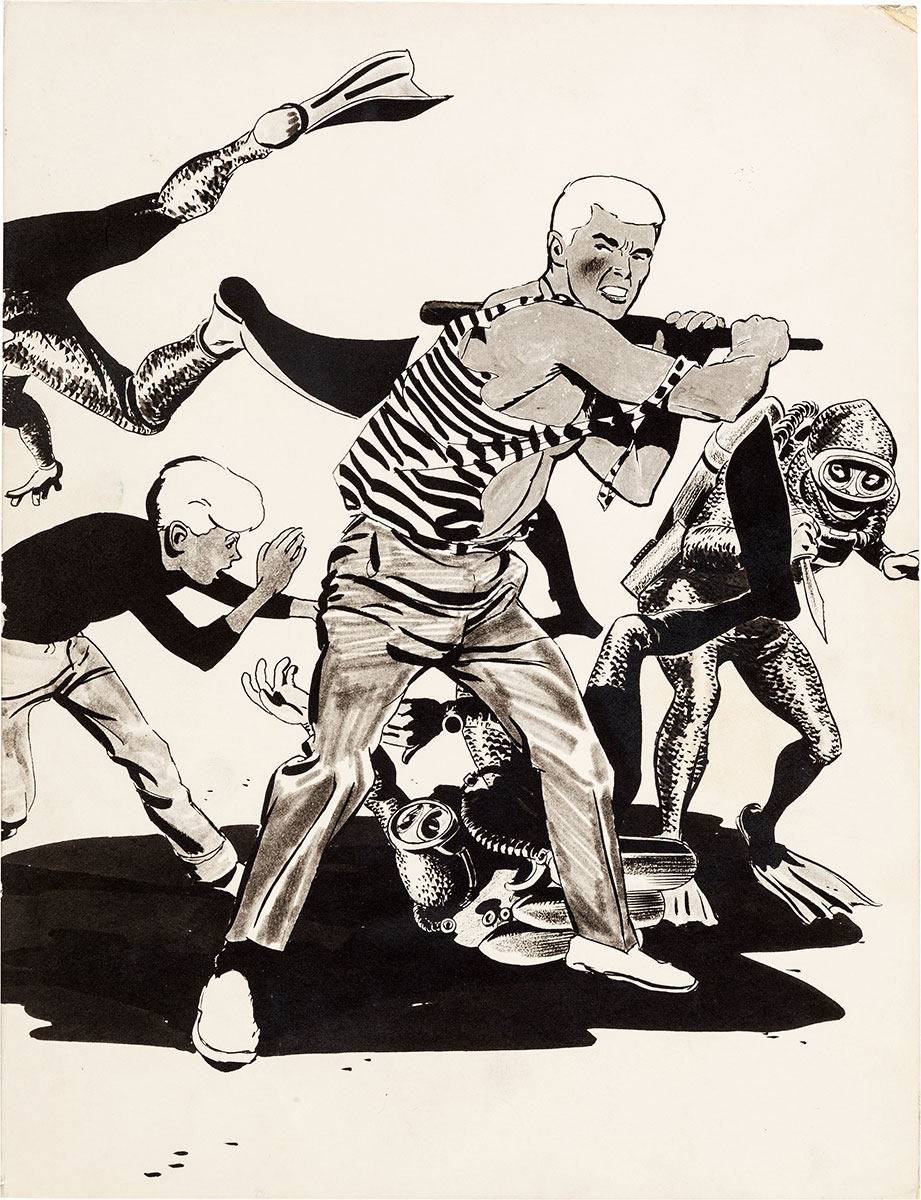TV
Doctor Who: The Return of Doctor Mysterio (aka 2016 Christmas Special) – Grade: B+
Superficially, there doesn’t seem to be much resemblance between the classic version of Doctor Who that ran from 1963–1989 and the modern one that began in 2006. If the classic Doctor Who looked slightly cheap then the modern one looks like a little money was spent on each episode. If the classic Doctor Who had mostly self-contained stories, then the modern one has season, if not series, long stories. But I think in tone the modern version of Doctor Who is actually a lot closer to the classic one than it might seem from the outside which is exemplified in the latest Christmas “The Return of Doctor Mysterio” episode.
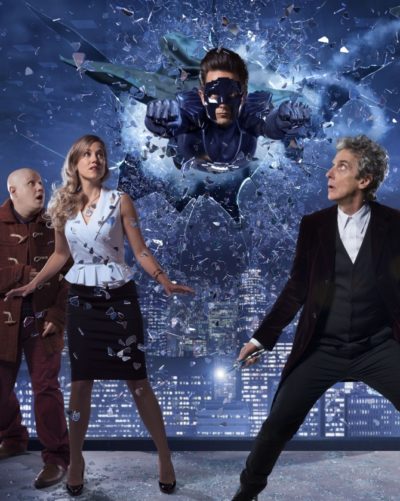 This time, the Doctor (Peter Capaldi) finds himself in New York where a group of aliens are set on taking over the world. Using a cover corporation called “Harmony Shoals,” these aliens just so happen to be the size and shape of our brains and their plan includes luring people to their buildings around the planet and removing the brains of all the politicians on the globe and replacing them with these brain-looking aliens. In an homage to the Superman story, investigating Harmony Shoals is dogged reporter Lucy Fletcher (Charity Wakefield) who meets the Doctor and his assistant (Matt Lucas) who are also scoping out the corporation. And there’s also a Superman-like superhero flying around New York City called the Ghost aka Grant Gordon (Justin Chatwin) who the Doctor knows and accidentally created decades prior when he met him as a child. As the aliens begin to put their devious plan into motion and threaten the fate of the entire planet, it’s more of a question as to whether Lucy will ever figure out that the Ghost is really her nanny Grant Gordon as to if the aliens will succeed in taking over the planet.
This time, the Doctor (Peter Capaldi) finds himself in New York where a group of aliens are set on taking over the world. Using a cover corporation called “Harmony Shoals,” these aliens just so happen to be the size and shape of our brains and their plan includes luring people to their buildings around the planet and removing the brains of all the politicians on the globe and replacing them with these brain-looking aliens. In an homage to the Superman story, investigating Harmony Shoals is dogged reporter Lucy Fletcher (Charity Wakefield) who meets the Doctor and his assistant (Matt Lucas) who are also scoping out the corporation. And there’s also a Superman-like superhero flying around New York City called the Ghost aka Grant Gordon (Justin Chatwin) who the Doctor knows and accidentally created decades prior when he met him as a child. As the aliens begin to put their devious plan into motion and threaten the fate of the entire planet, it’s more of a question as to whether Lucy will ever figure out that the Ghost is really her nanny Grant Gordon as to if the aliens will succeed in taking over the planet.
Which to me is a story only Doctor Who, either classic or modern, could do with a straight face and get away with it, to take a story that might seem silly and goody and present them as a straight sci-fi/fantasy story without irony or laughs.
And I think that’s part of the strengths and weaknesses of Doctor Who. Right now most critically acclaimed sci-fi series push hard in the direction of gritty reality, of which Doctor Who certainly doesn’t. Doctor Who is a sort of anthesis series to heavy shows like The Expanse and Westworld and is also a bit of an anachronism to older styles of storytelling. However, that might also be a good thing for Doctor Who — while every other series can be seen as being of our times Doctor Who instead stands out as a series slightly out of time, more harkening back to the sci-fi series of the past than today. And that might help the series for viewers in the future. Doctor Who might never feel old and dated since it’s always been a bit old and dated to begin with whereas the other series of our time might feel too much of our time and not relatable to future viewers.
A whole heck of a lot of TV
Over the past year I’ve been reviewing new episodes of TV series here in these weekly Direct Beams Comms. I don’t pretend to review all or even most new comedies and dramas released but I did review all the comedies and dramas I watched in 2016 which turned out to be 45 brand new TV series. If you consider that most TV series I watch tend to air between five and 13 episodes the means there’s somewhere between 225 and 585 episodes of TV out there of just these new shows I watched.
In addition, I watched 15 shows that were in their second or further seasons meaning there’s anywhere between 75 and 195 episodes of those shows I watched too.
Which is a lot of TV — that doesn’t seem to be stopping anytime soon.
Looking out over the calendar there’s new TV series I’m interested in checking out each week from now until mid-February. And that’s just counting NEW series, not returning ones. And my guess is that calendar stops in February not because there’s a break in new shows being launched but because that’s all the further out the calendars I found online happen to go out.
The one good thing with all these hours of TV is that since new series are being launched all year long it means there’s a lot of TV watching for me that’s spread out over the months. But that also means that there’s somewhat of a commitment on my part to watch all these shows since there are always new ones due out next week.
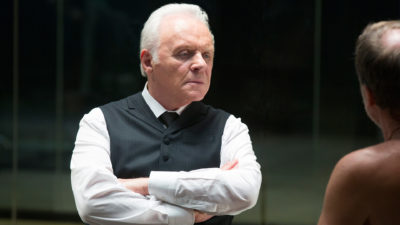
What’s most fascinating is that while I watched around 60 scripted shows last season, this represents only about 13% of the total amount of new series out there, more than 450 this year in a recent report. Which is the best of times since there are so many series channels are willing to take chances on TV shows that wouldn’t ever have gotten made a few years ago. Even edited for content I can’t imagine a series like Westworld ever being shown on network or even cable TV in its current form without being turned into something more episodic even this decade. And I can’t ever see something like the five part documentary series O.J.: Made in America having aired on ESPN of all places finding a TV home other than right now. We might have gotten a one hour special on O.J. years ago, but a five part multi-night documentary would have been out of the question.
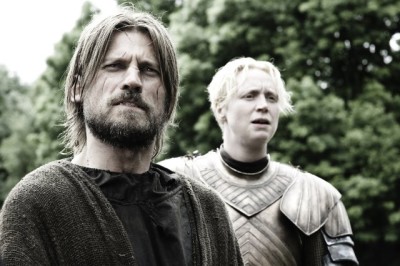
All of which makes me wonder, if we’re living in this wonderful time where there are quite literally AMAZING brand-new TV series being created and released year after year, how does all this sustain itself? Right now we’re living in a time where there are all these different content channels from network to cable to streaming all looking for series and all willing to shell out big-bucks in some cases to get it. (Reportedly a single season of Game of Thrones costs HBO about $60 million and Westworld $100.) But they’re willing to spend this money right now because all these channels are trying to stake their claim and be the one place people go for their entertainment in the future and are willing to spend, spend and spend to get this.
But what happens in a few years when the economics change, maybe people are less interested in watching scripted series and there are the inevitable channel collapses, acquisitions and mergers? What happens then, I think, are channels and networks less willing to spend such amounts on TV series and less willing to fund loads and loads of new shows. And I don’t think this day is that far in the future — it really can’t be with the amount of money being spent and lost on series.
People always talk about how great the movies of the 1970s were and how movies since were never able to capture that same spark. Or, if they were able to capture that spark it was only for a movie or two or for a short period of time. I think that’s what’s happening with TV series right now — we’re living in this golden age of TV with all these different choices and options where there are all these amazing shows and it just can’t last.
The Expanse season 2 TV commercial
“Are all your plans always this vague?”
The Reading List
The 52 Most Anticipated Movies of 2017
This week in pop-culture history
- 1993: Star Trek: Deep Space Nine premiers
- 1996: Twelve Monkeys is released in theaters
- 2007: Children of Men premiers in theaters
